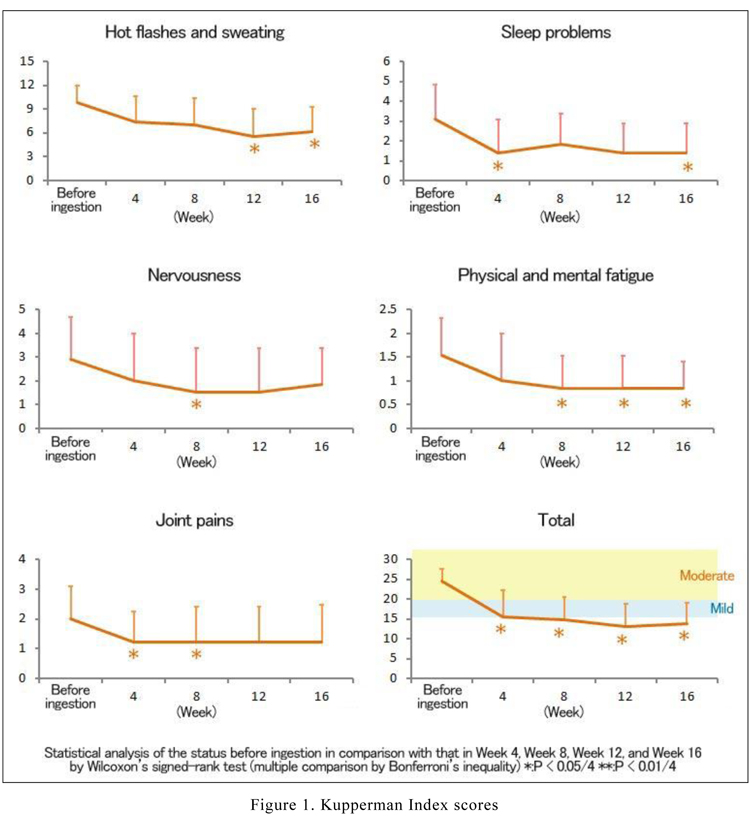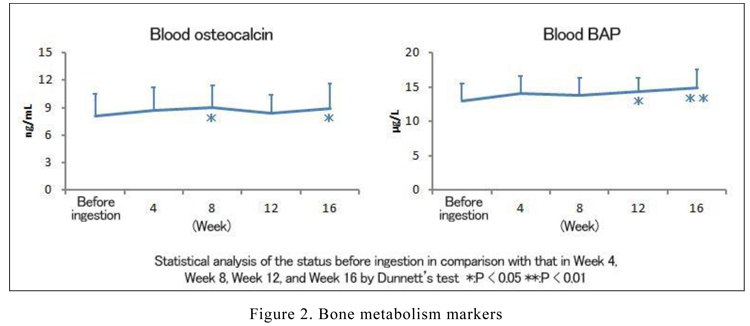- TOP
- List of reports
- Effect of Acanthopanax senticosus Harms to improve the menopausal general malaise
and bone metabolism : Randomized placebo-controlled trial
Effect of Acanthopanax senticosus Harms to improve the menopausal general malaise and bone metabolism : Randomized placebo-controlled trial
【Scientific information】
Research and Development Department, Sun Chlorella Corporation
Effect of Acanthopanax senticosus Harms to improve the menopausal
general malaise and bone metabolism : Randomized placebo-controlled trial
Presented at The 13th Annual meeting of the Japanese Society of Preventive Medicine, 2015
- Study Objectives
- Five years around menopause, also known as perimenopause, is generally regarded as the time period during which menopausal symptoms appear because of the complex factors including decreased follicular hormone (estrogen), physical changes associated with aging, psychological disturbances, and changes in sociocultural environmental factors. Typical symptoms include hot flashes, irritation, and dizziness. Approximately 50%–80% women in the menopause stage suffer from these symptoms. Most women of this generation are often occupied with work and child rearing. Therefore, the alleviation of menopausal symptoms is expected to help improve the quality of life (QOL) of women. In the past, we have reported the anti-fatigue and sleep-improving effects of Acanthopanax senticosus (AS). Because the number of reports on the effect of AS to improve menopausal general malaise is limited, we examined the effects of AS in women during menopause.
- Method of experiments
- We included 13 women who experienced menopausal general malaise for ≥1 year after the final menstrual cycle. These women scored ≥16 and ≤34 points (indicating mild to moderate severity of general malaise) on the Kupperman Index (KI)*1, a questionnaire surv ey to assess the menopausal general malaise of the subjects. All the subjects were asked to take AS food using the AS root powder as the raw material, i.e., they took 4g (20 tablets) of AS food twice a day after breakfast and dinner for 16 weeks. Their KI scores, bone metabolism markers {blood osteocalcin, blood bone alkaline phosphatase (BAP), NTX/creatinine correction, blood tartrate-resistant acid phosphatase 5b (TRACP-5b)}, and sex hormones (serum estradiol, follicular stimulating hormone, and serum tes tosterone) were determined every 4 weeks.
- Results
- The KI scores resulted in a significant decrease in scores when compared to the baseline
(before ingestion of AS food) and improvement over a number of treatment weeks: hot
flashes and sweating (Week 12 and 16), sleep problems (Week 4 and 16), nervousness (Week
8), physical and mental fatigue (Week 8, 12, 16), joint pains (Week 4 and 8), and total score
(Week 4, 8, 12, 16) (Fig. 1). The subjects had moderate severity of general malaise
symptoms according to KI, and the total score improvement indicated symptom
improvement to mild severity in Week 12 and 16. The symptoms that greatly contributed to the decrease in total score were vasomotor nerve disorder-like symptoms and insomnia.
The bone metabolism markers also demonstrated a significant increase in blood osteocalcin in Week 8 and 12 and blood BAP in Week 12 and 16 (Fig. 2). No change was observed in sex hormone levels with AS food. In conclusion, these results suggest that Acanthopanax senticosus is useful in improving the QOL of women during menopause by reducing general malaise and improving bone metabolism.


Terminology
- *1: Kupperman Index Questionnaire.
- This is a questionnaire test asking the subjects to indicate the severity of 11 symptoms observed in
menopausal general malaise in 4 stages. The value obtained from the subject is multiplied by the
weighting coefficient to each symptom for each item, and the assessment is based on the score of each
item and the total score calculated. The larger the value, the severer the symptom. The 11
symptoms are as shown in the following.
1. Hot flashes and sweating: Facial hot flashes (hot sensation), sweating easily, cold sensation in the hips and limbs, short breath.
2. Paresthesia: Numb limbs, blunt sensation of limbs.
3. Sleep problems: Difficulty in going to sleep at night, awake soon after going to sleep at night.
4. Nervousness: Easily excited, nervous.
5. Depressive mood: Worrying over trivial matters, frequently depressed.
6. Dizziness: Presence of dizziness and nausea.
7. Physical and mental fatigue: Easily tired.
8. Joint pains: Stiff shoulders, lumbar pain, pain in the joints of limbs.
9. Headaches: Headache.
10. Heart palpitations: Palpitation of the heart.
11. Formication: Feeling as if insects are crawling over the skin.
Details
- Name of meeting:
- The 13th Annual meeting of the Japanese Society of Preventive Medicine (2015)
- Title:
- Effect of Acanthopanax senticosus Harms to improve the menopausal general malaise and bone metabolism : Randomized placebo-controlled trial
- Authors:
- Masako Hoshizaki1, Hideo Takekoshi1, Kou Masuda2, Masami Saito2
- Affiliation:
- 1)Sun Chlorella Corporation,2)SOUKEN Co.Ltd.





